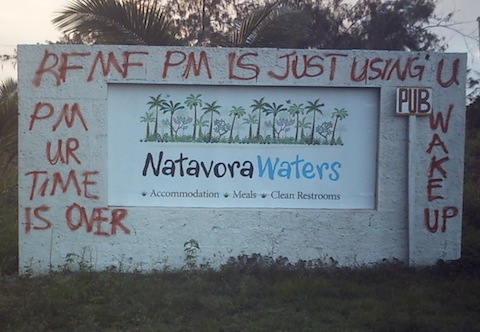
In most corners of the world, graffiti artists operate in fear of being nabbed for vandalism. In totalitarian Fiji, they face far more serious charges, at least if their scrawled messages carry the whiff of the political:
A New Zealand businessman is in custody in Fiji along with four others who have been arrested over anti-military regime graffiti in Suva in August.
The five, including Sri Lankan born New Zealand citizen Jagath Karunaratne, appeared in the Suva Magistrate’s Court yesterday charged with sedition for graffiti against military strong man Voreqe Bainimarama.
When the graffiti first appeared in August along the Nausori-Suva road, it was claimed to be been put there by a group calling itself the Viti Revolutionary Forces (VRF).
The hastily painted graffiti said things like “PM out you lier” (sic), “RFMF remove Frank … VRT” and “PM your time is over”.
A gallery of the offending graffiti is available here. It is, of course, ridiculous to think that political agitation of this mild, non-violent nature could be punished as severely as the actual execution of a violent coup. But as this interview regarding another pending case makes clear, Fiji’s sedition laws are designed with exactly this sort of persecution in mind:
HILL: Daniel Urai, the trade unionist, has been charged under a section of the crimes act which talks about, not just opposition to the government, but also creating some sort of political violence. Is sedition that kind of a crime?
HODGE: Well, there’s no requirement for violence. One of the subsections does refer to encouraging violence or lawlessness or disorder, but another one is to procure alterations of matters affecting the Constitution, laws or the government. So it may be that he went to an overseas conference and suggested that there should be support for changing the form of government or changing the form of laws or something like that and technically, I have to agree with the military dictatorship there. Technically, he is probably in violation of seeking a change to aspects of the legal system and or the government to Fiji.
HILL: So he’s guilty?
HODGE: Well, of that statute, yes.
A sobering situation to keep in mind the next time you hear someone in the U.S. complain about how their free-speech rights are being violated simply because other private citizens respond with more speech.
(Image via Fiji Coup 2006)


Jordan // Nov 7, 2011 at 11:15 am
With a definition of sedition that broad, it sounds like lawmakers would be acting seditiously every time they proposed new laws.
Groggy | Microkhan by Brendan I. Koerner // Nov 29, 2011 at 10:27 am
[…] are having problems with First World diseases, especially those related to obesity. Fiji’s dictatorial government believes that its citizens’ expanding waistlines are due not only to food consumption, but […]